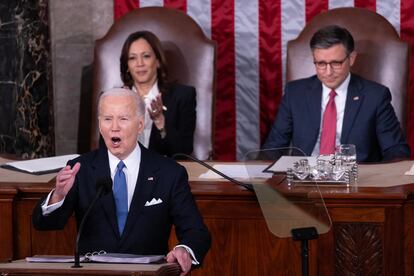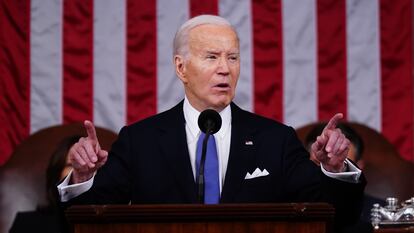Biden asks for aid to Ukraine to halt Putin and says Israel must not use humanitarian aid as a bargaining chip
The president called on Congress to approve military aid for Kyiv and officially announced the US army would help construct a temporary port on the coast of the Strip


Foreign policy bookended President Joe Biden’s State of the Union address. In two blocks separated by domestic issues, the Democratic leader made an energetic defense of aid to Kyiv and, to close his speech, of the U.S. contribution to humanitarian aid to remedy the catastrophic situation in Gaza, with nods to both parties in the conflict, especially, for the first time, to Israel. The Ukrainian chapter and that of the Middle East, together with a coda on the U.S. rivalry with China, were Biden’s references to a convulsive world of global instability, which is also causing him headaches at home: the Republicans by blocking aid to Ukraine in Congress, and the Democrats by asking him for concrete actions to alleviate the humanitarian disaster in Gaza. The flood of punitive votes in the Super Tuesday primaries in protest against his support for Israel also did not go unanswered, given Biden’s fate in November will be partly linked to his Middle East policy.
Biden spoke of turbulent times, in which “freedom and democracy are under attack, both at home and overseas, at the very same time. Overseas, Putin of Russia is on the march, invading Ukraine and sowing chaos throughout Europe and beyond. If anybody in this room thinks Putin will stop at Ukraine, I assure you, he will not. But Ukraine can stop Putin if we stand with Ukraine and provide the weapons it needs to defend itself. That is all Ukraine is asking. They are not asking for American soldiers. In fact, there are no American soldiers at war in Ukraine. And I am determined to keep it that way.”
Barely four minutes into his speech, Biden took advantage of the war in Europe to throw the first barb at his Republican rival, Donald Trump. Without naming him, the president lamented Trump’s recent statements inviting Moscow to “do whatever the hell they want” with NATO allies who do not contribute fully to the Alliance’s budget. Biden compared him to a predecessor and co-religionist of his: “It wasn’t that long ago when a Republican President, Ronald Reagan, thundered, ‘Mr. Gorbachev, tear down this wall.’ Now, my predecessor, a former Republican President, tells Putin, ‘Do whatever the hell you want.’ A former American President actually said that, bowing down to a Russian leader. It’s outrageous. It’s dangerous. It’s unacceptable.”
Addressing Congress, Biden asked: “We must stand up to Putin. Send me the Bipartisan National Security Bill [passed by the Senate, blocked in the House by Republicans]. History is watching. If the United States walks away now, it will put Ukraine at risk. Europe at risk. The free world at risk, emboldening others who wish to do us harm.” He also had a direct message for his Russian counterpart: “My message to President Putin is simple. We will not walk away. We will not bow down. I will not bow down. History is watching, just like history watched three years ago on January 6th,” the day a horde of Trump supporters stormed the U.S. Capitol in 2021. The equivalence between freedom and democracy, between the U.S. and the world, ran through his message. Without making an excessive profession of Atlanticist faith, Biden celebrated the recent additions of Finland and Sweden to the NATO alliance.
After the bulk of the speech, devoted to domestic issues, Biden closed with the Middle East and the rivalry with China. The first issue was the most anticipated, after it was announced earlier Thursday that the U.S. will establish a humanitarian aid point on the Gaza coast. But his words on the war between Israel and Hamas were particularly long overdue.
The pressure on the White House from Democratic voters who reject support for Israel is increasingly pressing, as the primaries in Michigan and Minnesota, among others, have shown. Biden used his speech to officially announce a plan by which the U.S. army will help establish a temporary port on the coast of the Strip: it is not only Democratic voters who are pressuring him, but also many lawmakers within the party.
“As we manage challenges at home, we’re also managing crises abroad including in the Middle East,” he said after reviewing health care, immigration, and reproductive rights. “I know the last five months have been gut-wrenching for so many people, for the Israeli people, the Palestinian people, and so many here in America,” Biden conceded, referring to the victims on both sides, some of whose families were present in the room. Biden recapped what has happened since October 7, “the deadliest day for the Jewish people since the Holocaust.”
Israel has the right to pursue Hamas, he said, although it has “an added burden” because the Islamist group “hides and operates among the civilian population.” But, he stressed in line with the strongest comments in recent days from Vice-President Kamala Harris, “Israel also has a fundamental responsibility to protect innocent civilians in Gaza. “More than 30,000 Palestinians have been killed. Most of whom are not Hamas. Thousands and thousands are innocent women and children. Girls and boys also orphaned. Nearly 2 million more Palestinians under bombardment or displaced. Homes destroyed, neighborhoods in rubble, cities in ruin. Families without food, water, medicine. It’s heartbreaking.”

Defense of the two-state solution
Biden, who demanded the immediate release of all hostages held by Hamas, explained that his administration has been working to establish “an immediate cease-fire that would last for at least six weeks.” Despite the presence in the room of his ambassador to the United Nations, Linda Thomas-Greenfield, he did not mention the three vetoes with which his country has blocked humanitarian ceasefire initiatives in the Security Council. He did though emphasize U.S. leadership in the international community’s efforts to get more aid into Gaza, citing the announced plan for a temporary dock on its coast as an example. “Tonight, I’m directing the U.S. military to lead an emergency mission to establish a temporary pier in the Mediterranean on the Gaza coast that can receive large ships carrying food, water, medicine and temporary shelters. No U.S. boots will be on the ground. This temporary pier would enable a massive increase in the amount of humanitarian assistance getting into Gaza every day. But Israel must also do its part,” by allowing more aid into the Strip and ensuring that humanitarian workers “aren’t caught in the cross fire.”
“To the leadership of Israel I say this. Humanitarian assistance cannot be a secondary consideration or a bargaining chip. Protecting and saving innocent lives has to be a priority. As we look to the future, the only real solution is a two-state solution. I say this as a lifelong supporter of Israel and the only American president to visit Israel in wartime. There is no other path that guarantees Israel’s security and democracy.”
Biden also addressed the risk of regional conflict, the need to contain the threat posed by Iran as a prerequisite for stability in the Middle East, and that of maritime security in the Red Sea, with “strikes to degrade Houthi capabilities and defend U.S. Forces in the region” which, he warned, would be repeated if necessary.
China and the commercial and geostrategic competition between the two superpowers capped off the speech. “For years, all I’ve heard from my Republican friends and so many others is China’s on the rise and America is falling behind. They’ve got it backward. America is rising. We have the best economy in the world. Since I’ve come to office, our GDP is up. And our trade deficit with China is down to the lowest point in over a decade. We’re standing up against China’s unfair economic practices. And standing up for peace and stability across the Taiwan Strait,” he said. He also accused Trump of not having thought of betting on partnerships and alliances in the Pacific as the Democrat has done during his mandate, with novel initiatives such as Aukus, an alliance created to confront Beijing, and noted he had “made sure that the most advanced American technologies can’t be used in China’s weapons. Frankly for all his tough talk on China, it never occurred to my predecessor to do that.,” As such, Biden concluded with the same optimistic tone that defined the other chapters of his message: “We want competition with China, but not conflict. And we’re in a stronger position to win the competition for the 21st Century against China or anyone else for that matter.”
Sign up for our weekly newsletter to get more English-language news coverage from EL PAÍS USA Edition
Tu suscripción se está usando en otro dispositivo
¿Quieres añadir otro usuario a tu suscripción?
Si continúas leyendo en este dispositivo, no se podrá leer en el otro.
FlechaTu suscripción se está usando en otro dispositivo y solo puedes acceder a EL PAÍS desde un dispositivo a la vez.
Si quieres compartir tu cuenta, cambia tu suscripción a la modalidad Premium, así podrás añadir otro usuario. Cada uno accederá con su propia cuenta de email, lo que os permitirá personalizar vuestra experiencia en EL PAÍS.
¿Tienes una suscripción de empresa? Accede aquí para contratar más cuentas.
En el caso de no saber quién está usando tu cuenta, te recomendamos cambiar tu contraseña aquí.
Si decides continuar compartiendo tu cuenta, este mensaje se mostrará en tu dispositivo y en el de la otra persona que está usando tu cuenta de forma indefinida, afectando a tu experiencia de lectura. Puedes consultar aquí los términos y condiciones de la suscripción digital.








































